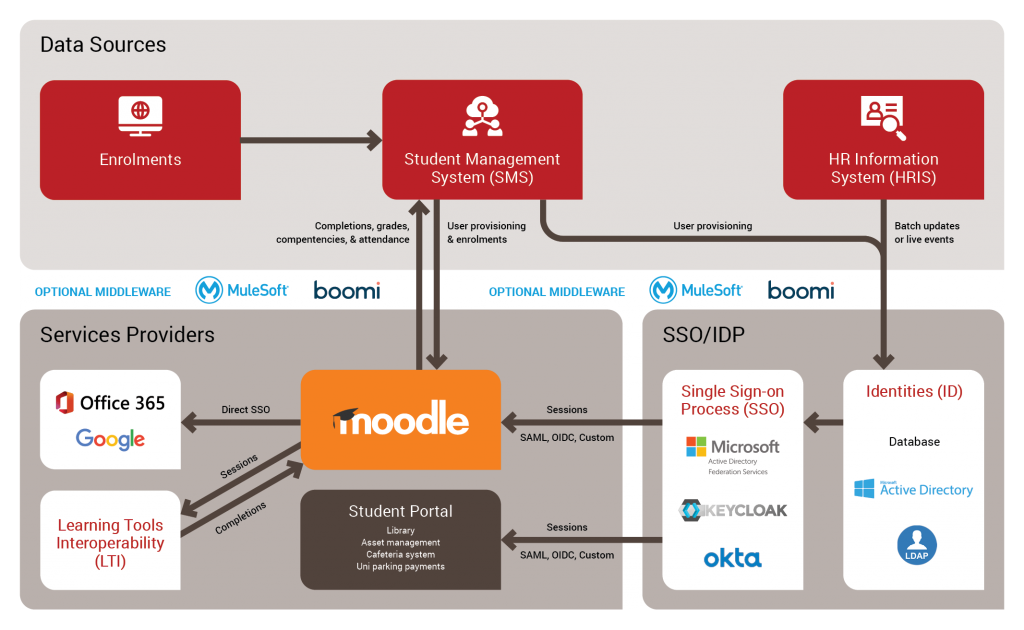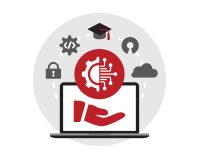Enterprise LMS – what is it and how does it work?
In IT, the term ‘Enterprise’ translates as hardware and software designed to meet the demands of a large organisation. In contrast to small entities, an enterprise has greater requirements for availability, compatibility / integration, reliability, scalability, performance and security, among other things. So what is an Enterprise Learning Management System (LMS)?
LMS technology has evolved over the last few decades, from the early days of basic scheduling and content delivery to today’s option of a fully integrated platform that services the professional and academic needs of users. Beyond learning, an LMS can act as the core technology platform that integrates many other technology systems together, such as enrolment platforms, course management systems, identity and access management systems, and certification management platforms. It is also an integral component of predicting student success.
What makes an LMS enterprise-ready: the key elements.
Fundamentally, there are two different elements that make your LMS ‘Enterprise-Ready’.
First is the resilience of your platform i.e. its availability, reliability, security and overall performance that scales. This is a pre-requisite to being considered Enterprise.
Second, there the consideration of compatibility and integration. This element is more complex and tends to be unique to each organisation, depending on the technologies involved and the business goals that need to be achieved.

Generally speaking, aside from mapping the course content for your user community, you should be considering mapping workflows for areas such as user provisioning, payment systems integration, enrolments, course development tools integration for publishing new material, resource scheduling for teachers and facilitators, and the information artefacts associated with each workflow.
A fully integrated LMS will handle the delivery and management of examinations and certificate issuance, student records management and course material provisioning. A truly Enterprise LMS will also support a comprehensive administration capability, one that supports the ongoing provision of effective services to the business, even as requirements change.
Which LMS will best fit your organisation needs?
With all the demands of an Enterprise LMS, you’ll need to map your requirements to the available vendor platforms on the market.
Many of the platforms today are designed to support complex administration and management requirements and provide built-in capabilities to manage extensive learning syllabi like those associated with a university. The challenge is, the LMS market consists of well over 500 solutions. Tying your requirements to the right vendors can be complex, time-consuming and downright confusing.
When reviewing vendors, factors such as cost and associated licensing models, along with available support models are vitally important to understand before you commit to a solution. As you might expect, the broader the set of requirements you have, the more expensive a commercial vendor’s platform will become.
Read: What’s Holding Us Back from Being ‘Open’?
Another key factor is how a platform supports modern delivery models for learning, since considerations of how different user communities engage with learning content should be front of mind for your solution architects. For example, micro-learning solutions are great for modernising mobile delivery methods for your course material. However, you need to overlay this with your academic needs such as multinational course delivery across your university user base.
Total cost of ownership of your LMS.
Calculating your financial commitment to a technology is key, not many organisations have an uncapped budget. Look at the end-to-end costs of running a platform, not just the price of the platform itself.
Total cost of ownership (TCO) for software is usually calculated by including the up-front costs of the software itself and licensing for end users. Then there’s the costs associated with administration, complex workflow design and implementation, support from vendors or contractors, and how quickly the solution can service your overall business needs (time to value).
Some vendor solutions are expensive to purchase, pushing up your capital investment, but ongoing support is included along with implementation assistance. This may be a good option for keeping ongoing operational costs low. However, be aware that you may get a standard suite of functionality. Other solutions can flip this model, with no platform costs (for example open-source software platforms like Moodle). However, they do require design and build costs, as well as ongoing support and maintenance. The key to success here is choosing the right technology services partner to work with.
Ensuring architecture for evolving delivery models.
Since the COVID-19 Pandemic, many organisations have changed the way learning and development works. Universities and colleges have led the transition to new delivery models, either full e-learning or hybrid learning, with a blend of live online and e-learning modules used to achieve a single outcome.
The rapid use case change in LMSs has meant the technology has been pressure tested to scale. There has been a step change from managing just a handful of students interacting remotely, to an entire user base needing to access material using the different delivery models.
Explore how Catalyst helped UCL scale its Moodle
The changes in demands on Enterprise LMS technology have driven new complexities in integration and authentication, where broader security requirements such as Single Sign-On (SSO) and Multi-factor Authentication (MFA) are required to make it easy for users to move to these new models, while maintaining the organisation’s overall security posture.
When adapting to the environment around us, we cannot and must not forget the impact of learning delivery models on learning outcomes. This is critical to the maintaining the standards and success of the learners, the educators and the institutions themselves.
The shift to online learning has meant that it is more important than ever for organisations to be on top of their service delivery and the quality of teaching. A crucial set of metrics for the Higher Education sector in Australia, published each year, are the Quality Indicators for Learning and Teaching (QILT) surveys. While their primary purpose is to provide prospective students with comparative statistics on the real-life experiences of current students and recent graduates in Australian Universities, they have been extremely helpful in measuring and assessing the impact of changing delivery models on students and how they feel about the changes.
Read: Do You Have all the Right Tools to Deliver Better Student Experience?
Open source Enterprise LMS support.
With open source technology, such as Moodle, the quality and experience of your service provider can be the difference between success, mediocrity and failure. Finding a provider that has proven experience of delivering ongoing support for Enterprise LMS in your industry is a very good indicator to go by.
Catalyst services for LMS
 The team here at Catalyst, has extensive experience in working directly with multiple enterprise teams to build Moodle and Totara solutions that deliver high performance, cyber resilient platforms, as well as competitive TCO. We’d recommend that you invest at the beginning, to establish a strong foundation and structure to support things that matter to your business today and into the future.
The team here at Catalyst, has extensive experience in working directly with multiple enterprise teams to build Moodle and Totara solutions that deliver high performance, cyber resilient platforms, as well as competitive TCO. We’d recommend that you invest at the beginning, to establish a strong foundation and structure to support things that matter to your business today and into the future.
Explore Catalyst Customer Success Stories
Our deployment team works to ensure that LMS administration processes are created as enterprise workflows, such that ongoing support for tasks including user provisioning and course development are simple and easy to manage internally without needing vendor support.
Catalyst is a Premium Moodle Certified Partner, working with the technology since 2004. Our team has extensive experience of building custom architectures, deployment models, plugins and add-ons and a set of integrations that allow us to build fully enterprise ready learning solutions to meet any need, at any scale, be it on premise or in the Cloud.
For more information on designing and delivering an Enterprise LMS to meet your organisation’s needs, contact the team at Catalyst today.



